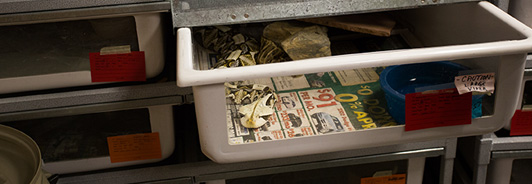 I was raised in Juarez, Mexico, a border town to El Paso, Texas. With many worries in my home country and hopes of a better life, my parents brought our family to the United States.
I was raised in Juarez, Mexico, a border town to El Paso, Texas. With many worries in my home country and hopes of a better life, my parents brought our family to the United States.
I arrived in Greeley in July 2003 and began fifth grade that fall. I had never seen a college in my hometown. Staring up at Guggenheim and Kepner halls from 8th Avenue, I was dumbfounded by the tall stairs with the overwhelming columns, all surrounded by students hurrying off to class. My parents had dropped out of high school, and I was just trying to get through fifth grade with a goal of making it to middle school.
UNC was my Harvard.
I first was on campus as a 10 year old — Dumpster diving behind the dorms. Struggling financially, my mother, sister, and I would go through the alleys in town and collect aluminum cans to cash in for a few extra dollars. Late April, when students left campus, was always the best time. These kids were so wasteful; we found so many treasures.
In school, learning the language and the class curriculum simultaneously was difficult. One day, my math teacher told me about a UNC program called Las Chicas de Mathematicas. I would finally get to come to UNC as a student! The program was a summer camp, where even though we had to do math all day, we stayed in the dorms, went to the pool, and even ate at the dining halls. Las Chicas helped me become more involved and academically focused. So many of my classmates fear math — I’m glad as a science major that I had the chance to become comfortable with the subject (my little sister has been accepted to the camp this summer.)
During my senior year, I had taken all of the math classes my high school offered, including calculus and statistics. Every Monday, Wednesday, and Friday, I got on a big yellow bus, and from 11:15 to 12:05, I was a college student taking math classes at UNC. This was of such great significance to me because I was an undocumented student at the time and college didn’t seem realistic. Tuition more than doubled, loans and financial aid were very limited, and I knew I couldn’t burden my family with the financial hardship of college tuition.
Attending classes at UNC changed my perspective. I was previously pessimistic in my outlook. I was stuck on the unfairness of it all. Each time I sat in calculus II as a high school student next to the REAL college kids, however, I became more inspired to do whatever it took to make it to college.
In spring 2010, I enrolled at Highlands University in New Mexico. I was awarded merit scholarships that covered out-of-state costs. Although I was thrilled to start my college education, I was somewhat discouraged. I was far from my family and the school didn’t offer the major I was interested in at the time.
But then I took a required introductory biology course. The professor was a researcher of anacondas and was recruiting students for a field study in Venezuela for the spring. The project consisted of walking in shallow water and shuffling and nudging the ground to find unsuspecting snakes. During the trip, I was bitten by a parrot, a lizard, a small caiman, bees that had to have been genetically morphed, and, yes, an anaconda. This experience changed the course of my life. I had discovered my passion. I was going to be a biologist.
My family and I were able to work out our residency paperwork. The day I became a U.S. resident, I applied to UNC and was accepted. Through the support of the McNair Scholars Program I have been able to continue my research. I found that there was a basement full of snakes over in Ross Hall. How lucky am I! Currently, I am conducting venom research of the Yucatan Rattlesnake with Dr. Steve Mackessy. Findings have the potential for helping in the development of improved therapeutics. I have had several opportunities to present my research, including at the National Conference on Undergraduate Research in Kentucky.
UNC biology classes were so hard, and they have not gotten any easier. During my first semester, I had organismal biology with Dr. Robert Reinsvold. I had to apply for scholarships, and I needed a letter of recommendation. I was hesitant to ask him because I didn’t think he knew me, but I was a new transfer up against a deadline — a short letter would have to do. I was speechless at the result — a very thought-out, full-page letter expanding on aspects I would not have imagined him to notice. What I thought would be the weakest part of my application was likely the strongest. Other professors I have had the privilege to have here at UNC do not fall short. Dr. Ginger Fisher, with all of her great advising, helped me spend a funded summer at UCLA School of Medicine — a dream school of mine. Dr. Mackessy has been my research mentor for the past two years. I came to him with no lab experience and little biochemistry knowledge. He did everything to help me learn and grow as a scientist. He has always listened and taught with humility and enthusiasm.
At UNC, I have been involved in the pre-health club and have served as president of honor societies. Through these, I have been able to give back to the community that raised me, and I am very thankful for that. I believe the combination of skills and self-esteem instilled in me by Las Chicas, and discipline of my early UNC courses, and all the support from the UNC community have helped me stand out from my scholastic peers and motivated me to chase all my dreams. As a result, I have been accepted to a master’s program this fall, and I will enroll debt free.
My parents have given me so much support and thanks to their sacrifices I’m here. With most of my family out of the country, they haven’t seen their siblings or their parents in 12 years — all for me to walk that stage in May. In many cases concerning my career path, however, my parents fall short of experience — college being so novel to our family. In these occasions I have had my UNC family to turn to. My professors here have given me knowledge, encouragement, and much-needed guidance. I hope to take all this and become an amazing individual like the many I have met in my journey at UNC.






